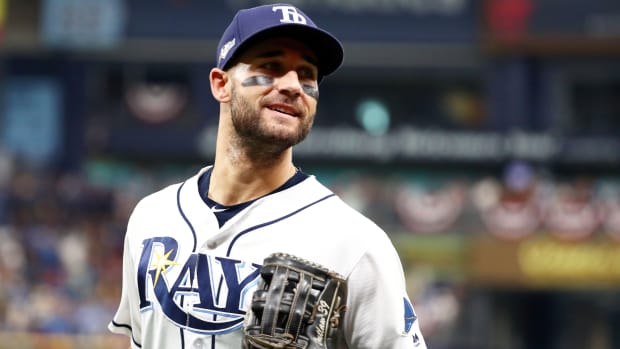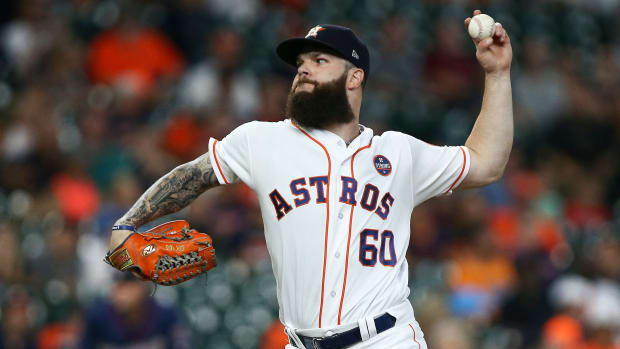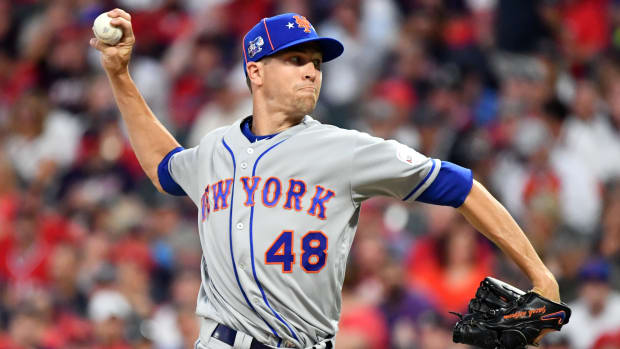With the 2020 MLB draft shortened to five rounds, here's a look at each team's best sleeper pick from the sixth round on since 2000.
Last month, MLB announced its 2020 draft would consist of only five rounds. Drafts in recent years have featured 40 rounds. So instead of 1,200-plus players getting a ticket to pro baseball, only 150 or so will this year. All players who go undrafted will be allowed to sign with any team for a maximum of $20,000.
But the loss of 35 rounds robs us of a favorite draft storyline: the hidden gem. The list of future MLB stars taken after the fifth round is extensive, which illustrates how significant a change of pace this year will be.
Since the 2000 draft, some teams have found franchise-changers after the fifth round; others have settled for more complimentary pieces, but the point remains: there's value to be found everywhere. Here's a look at each club's best selection after the fifth round this century. We favored picks where the player actually made contributions to the team that selected them, rather than those sleepers who were traded away before reaching the majors with their original team.
AL East
Baltimore Orioles: 1B/OF Trey Mancini (8th round, pick 249, 2013)
Mancini has been one of the few bright spots on some abysmal Orioles teams. He's hit 83 home runs over the past three seasons, and finished third in Rookie of the Year voting in 2017.
Boston Red Sox: 1B Kevin Youkilis (8th round, pick 343, 2001)
The guy with the funny stance who was only recruited by two Division I schools went on to become a three-time All-Star and two-time World Series champion. Youkilis quickly ascended through the minors thanks to his keen eye—A's general manager Billy Beane famously nicknamed him the "Greek God of Walks" in Michael Lewis' 2003 book Moneyball. He finished third in MVP voting in 2008, and slashed .306/.376/.568 for his career in the playoffs.
New York Yankees: RHP Dellin Betances (8th round, pick 254, 2006)
From 2014-18, he tossed 373 1/3 innings (nearly 75 per year) with a 2.22 ERA and 607 strikeouts (good for an absurd 14.6 K/9). Betances made the All-Star team four times during that run, and finished 14th in Cy Young Award voting in 2015 (84 innings, 1.50 ERA, 131 strikeouts).

Tampa Bay Rays: OF Kevin Kiermaier (31st round, pick 941, 2010)
Kiermaier remains one of the most underrated stars in the game. That's in part due to his injury woes—he's played in more than 110 games just twice in the past six seasons—but also because the bulk of his contributions come on defense. Kiermaier's sprint speed last year was 29.1 feet per second, and the three-time Gold Glove winner had the best jumps of any qualified outfielder, covering an average of 38.7 feet in the first three seconds of his jump.
Toronto Blue Jays: OF Kevin Pillar (32nd round, pick 979, 2011)
It's pretty surprising Pillar never won a Gold Glove award during his time in Toronto. He was a finalist each year from 2015-17, but lost out each time to Kevin Kiermaier (2015 and 2016) and Byron Buxton. Pillar hasn't been a finalist the past two seasons, but last year he set a career high with 21 home runs, and even picked up an MVP vote (despite a .287 on-base percentage).
AL Central
Chicago White Sox: LHP Hector Santiago (30th round, pick 915, 2006)
Santiago has been pretty well-traveled during his career. He's pitched for four different teams teams in nine seasons, and owns a 3.93 ERA in 138 games with Chicago. Perhaps his most notable contribution to the franchise has been transactional: he was involved in a three-team trade that netted the Sox Adam Eaton, who was later traded for a package that included 2019 All-Star Lucas Giolito.
Cleveland Indians: RHP Cody Allen (23rd round, pick 698, 2011)
For a time, Allen was among the most reliable relief pitchers in the game. From 2013-17, Allen had a 2.59 ERA and 122 saves, with 457 strikeouts in 344 2/3 innings.
Detroit Tigers: OF Matt Joyce (12th round, pick 360, 2006)
Yes, Joyce only played 92 games for the Tigers, but hear me out. He was traded in December 2008 for Edwin Jackson, who went 13-9 with a 3.62 ERA and was an All-Star in 2009. That offseason, the Tigers shipped Jackson and center fielder Curtis Granderson in a three-team deal with the Yankees and Diamondbacks for a package that included Max Scherzer, who blossomed into one of this generation's most dominant pitchers while in Detroit.
Kansas City Royals: OF Jarrod Dyson (50th round, pick 1,475, 2006)
Dyson spent seven seasons with the Royals, serving mostly as a fourth outfielder. But he amassed 11.6 bWAR in that role, and was an absolute terror on the base paths and in the field. The odds of a 50th-round pick ever sniffing a big league roster are basically zero. That Dyson has been a Major Leaguer for 10 seasons (and counting) is a truly commendable feat.
Minnesota Twins: 2B Brian Dozier (8th round, pick 252, 2009)
Last season's breakout star, Mitch Garver (ninth round, 2013), makes a strong case here, but Dozier has the more impressive body of work. He had back-to-back top 15 MVP finishes in 2016 and 2017, and was an All-Star in 2015.
AL West

Houston Astros: LHP Dallas Keuchel (7th round, pick 221, 2009)
Keuchel is the easy choice for the Astros. He spent four years in the minors and took his lumps when he made it to the big leagues, posting a 5.20 ERA in 47 games from 2012-13. He finally put it together in 2014, then won the Cy Young Award in 2015. He had a 3.58 ERA during the Astros' 2017 World Series run, with 32 strikeouts in 27.2 innings.
Los Angeles Angels: 2B Howie Kendrick (10th round, pick 294, 2002)
The Angels had a recent steal with the versatile David Fletcher (sixth round, 2015), but Kendrick's resumé stands out above the rest. Kendrick accumulated 28.5 bWAR as an Angel, slashing .292/.332/.424 with a 107 wRC+. He was an All-Star in 2011 and was a part of four Angels teams that made the playoffs.
Oakland Athletics: LHP Rich Harden (17th round, pick 510, 2000)
From 2003-08 with Oakland, Harden had a 3.16 ERA in 114 starts, though he topped 150 innings just once.
Seattle Mariners: LHP Doug Fister (7th round, pick 201, 2007)
There haven't been many deep cuts for the Mariners since the turn of the century. Fister tops the list, spending parts of three seasons in Seattle with a 3.81 ERA in 59 starts.
Texas Rangers: 2B Ian Kinsler (17th round, pick 496, 2003)
Kinsler is easily the Rangers' best late-round steal in recent draft history. The linchpin of back-to-back pennant-winning squads, Kinsler had two 30-30 seasons with the Rangers, and made three All-Star teams. He hit .307 during the 2011 playoffs, with 14 walks and six extra-base hits.
NL East
Atlanta Braves: RHP Kris Medlen (10th round, pick 310, 2006)
Medlen's diamond-in-the-rough status is only furthered by the path he took to big-league success. He threw 107 2/3 innings with a 3.68 ERA in 2010, but underwent Tommy John surgery at the end of the season. He came back in 2012 and was even better. From 2012-13, Medlen went 25-13 with a 2.47 ERA in 335 innings, working as a starter and out of the bullpen.
Miami Marlins: RHP A.J. Ramos (21st round, pick 638, 2009)
Ramos developed into a reliable relief pitcher for the Marlins. From 2013-16, he posted a 2.62 ERA in 278.1 innings. He saved 40 games for Miami in 2016 and made the All-Star team, striking out 73 batters in 64 innings.

New York Mets: RHP Jacob deGrom (9th round, pick 272, 2010)
DeGrom is the poster boy for later-round draft steals. He went undrafted out of high school, and played shortstop during his first two years at Stetson University. Since arriving in the big leagues, he's done nothing but dominate. Last year deGrom became the 11th pitcher to win back-to-back Cy Young Awards, joining a list that includes Max Scherzer, Pedro Martinez and Sandy Koufax.
Philadelphia Phillies: RHP Ken Giles (7th round, pick 241, 2011)
Before helping the Astros during their World Series run, Giles enjoyed two electric seasons in Philadelphia. He had a 1.56 ERA in 115 2/3 innings from 2014-15, with 151 strikeouts and just three home runs allowed.
Washington Nationals: OF Michael A. Taylor (6th round, pick 172, 2009)
The Nationals don't have any headliners taken past the fifth round in recent years, though Taylor has provided a solid return on a sixth-round investment. He's been a quality fourth outfielder during his career, peaking with a 2.8 bWAR season in 2017 in which he hit .271/.320/.486 with 19 homers in 432 plate appearances.
NL Central
Chicago Cubs: C Geovany Soto (11th round, pick 318, 2001)
Soto's best big-league season ended up being his first one, but he still enjoyed a productive career in Chicago. He hit .285/.364/.504 with 23 home runs in 2008, making the All-Star team and winning NL Rookie of the Year honors. He put together 9.4 bWAR in eight seasons with the Cubs, and finished his career splitting time between the A's, White Sox and Angels.
Cincinnati Reds: C Tucker Barnhart (10th round, pick 299, 2009)
Barnhart has become a reliable backstop for the Reds, playing at least 110 games each year since 2015. He won a Gold Glove in 2017, and in September of that year signed a four-year contract worth at least $16 million. Barnhart set a career high with 11 home runs last season.
Milwaukee Brewers: OF Corey Hart (11th round, pick 321, 2000)
Hart developed into a consistent everyday player for the Brewers in the late 2000s. He hit .295/.353/.539 with 24 home runs in 2007, and made his first All-Star team in 2008. He was an All-Star again in 2010, setting career highs in home runs (31) and RBIs (102).
Pittsburgh Pirates: 2B Adam Frazier (6th round, pick 179, 2013)
Frazier made the most of his first crack as a full-time starter in 2019. He had a 2.0 bWAR with a career-high 50 extra-base hits. He's put together 6.2 bWAR as a Pirate, just beating out another late-round steal: outfielder Nate McLouth (25th round, 2000).

St. Louis Cardinals: 3B Matt Carpenter (13th round, pick 399, 2009)
His relative down year in 2019 notwithstanding, Carpenter has been a beacon of consistency for the Redbirds. He has a 28.3 career bWAR in nine seasons, with three All-Star selections. In 2013, he led the majors in runs (126), hits (199) and doubles (55), finishing fourth in MVP voting. Check back on this in 10 years, though, and last year's breakout, do-it-all star Tommy Edman (sixth round, 2016) could claim the title of the Cardinals' best draft steal.
NL West
Arizona Diamondbacks: 1B Paul Goldschmidt (8th round, pick 246, 2009)
Before praising Goldschmidt, don't forget about Brandon Webb (eighth round, 2000). Injuries ended Webb's career in 2009 at age 30, but he had a 3.27 ERA in 198 career starts (all with Arizona), winning the Cy Young Award in 2006 and finishing second in 2007 and 2008. Goldschmidt is a deserving winner, though, as he made six All-Star teams as a Diamondback and racked up 40.7 bWAR and 209 home runs in eight seasons.
Colorado Rockies: OF Dexter Fowler (14th round, pick 410, 2004)
In six seasons with the Rockies, Fowler put up 9.5 bWAR with 40 home runs and 83 stolen bases. He led the majors with 14 triples in 2010. Colorado has scooped up other talented players that they've failed to sign late in the draft over the years, like Chris Sale (21st round, 2007) and Dansby Swanson (38th round, 2012).
Los Angeles Dodgers: OF Matt Kemp (6th round, pick 181, 2003)
The Dodgers hit on productive sleepers in back-to-back drafts, taking catcher Russell Martin in the 17th round in 2002 before selecting Kemp in 2003. Kemp amassed 23.0 bWAR in 10 years with Los Angeles, peaking with his MVP runner-up season in 2011. That year, he led the NL in runs (115), home runs (39) and RBIs (126), and stole 40 bases. As a Dodger, he made three All-Star teams, won two Gold Glove awards and two Silver Sluggers.
San Diego Padres: OF Will Venable (7th round, pick 218, 2005)
Venable enjoyed a successful tenure with the Padres, one that largely went under-the-radar. He spent time as a fourth outfielder before evolving into a starter, and accumulated 13.3 bWAR in eight years with San Diego. His best season was in 2013, when he played a career-high 151 games and batted .268/.312/.484 with 22 home runs and 22 stolen bases.
San Francisco Giants: RHP Sergio Romo (28th round, pick 852, 2005)
This was a toss-up between two celebrated closers: Romo and his predecessor, Brian Wilson (24th round, 2003). Wilson led the Majors with 48 saves in 2010—the first of the San Francisco's even-year titles. Romo was as big a part of that team, with a 2.18 ERA in 68 games. And while Wilson closed out the 2010 World Series, Romo was a part of all three championship teams. He's pitched six scoreless innings across three World Series, with 10 strikeouts and just three baserunners allowed in 20 batters faced.